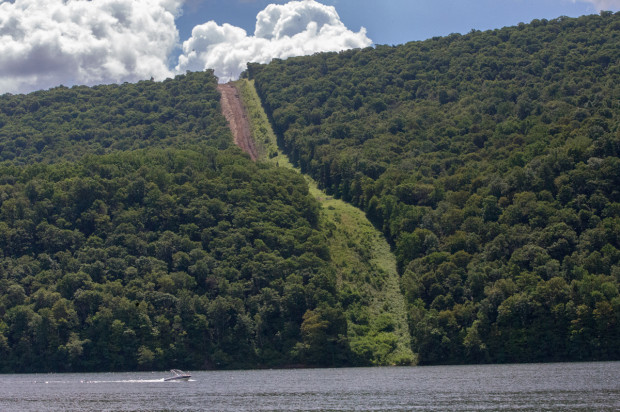Chesco homes hit with water problems near Sunoco pipeline construction site

Lindsay Lazarski / WHYY
Construction of the Mariner East 2 pipeline, seen here in Huntingdon County, may be linked to water problems in some households in Chester County.
Around a dozen Chester County households experienced cloudy water or loss of supply from their private wells this week, forcing some families from their homes near a location where Sunoco Pipeline is conducting horizontal directional drilling about 150 feet below ground for the construction of its Mariner East 2 pipeline.
Five families spent Wednesday night in a local hotel, and three of them spent a second night on Thursday away from their homes because of the water problems, according to the company, which supplied bottled water to affected homes.
Sunoco spokesman Jeff Shields said the company is investigating the cause of the water problems in West Whiteland Township, which were first reported to the Township on Monday. The company is now a subsidiary of Energy Transfer Partners.
The company has tested 11 private water wells, and was due to test another nine on Friday to determine whether its horizontal directional drilling (HDD) caused the water problems, Shields said. Although test results had not been given to West Whiteland Township officials by late morning, Shields indicated that HDD was the cause.
“I wouldn’t speculate on other possible causes,” Shields told StateImpact. “We will take care of the residents as if it’s our issue, unless evidence shows otherwise.”
Shields said he didn’t know how many households were affected in total because some had “genuine problems” while others were being tested as a precaution. “The families that have reported specific conditions range from cloudy water to a loss of water supply,” he said.
Sunoco suspended the drilling, which had been taking place between West Whiteland and Uwchlan Townships as part of the pipeline construction.
George Turner, a township supervisor, said he expects the tests will show that the water in the affected homes was turned cloudy by bentonite clay, a non-toxic substance used as a lubricant in horizontal directional drilling.
“I don’t think it’s going to be any surprise, they are going to say that the water’s cloudy and it’s got bentonite clay in it.” Turner said. He expects Sunoco to disclose the test results to township officials on Friday afternoon.
Turner said Sunoco has been responsive to the Township’s and residents’ concerns.
“Our concern is to make sure that our residents have a permanent solution to this so it doesn’t recur,” said Turner. “So that’s where we’re working with the Sunoco team, they have their geologists involved.”
Sunoco previously confirmed there were three separate releases of the drilling mud during pipeline construction in May, two of which were into Chester Creek at Brookhaven in Delaware County. Although bentonite clay is non-toxic, if discharged into surface waters in high quantities it can damage aquatic life.
The incident is the latest setback for the $3 billion pipeline project which will carry propane, ethane and butane from the Marcellus Shale of western Pennsylvania to an export terminal at Marcus Hook near Philadelphia.
Sunoco, which began construction in February, is fighting eminent domain cases with some landowners who have refused its offers of compensation for building on their property. Some communities at the eastern end of the route are opposing the pipeline, saying it could cause catastrophic explosions if there was a leak of the natural gas liquids.
The company insists it has high safety standards, and is tightly regulated at state and federal levels, but those assurances were called into question in April when the existing Mariner East 1 line leaked (20 barrels of propane) near Morgantown, an incident that the company did not publicly disclose for almost three weeks.
Shields said the company has notified the Pennsylvania Department of Environmental Protection, and the townships, and “will do everything in our power to minimize the impacts to homeowners.”
Virginia Cain, Community Relations Coordinator for the DEP’s southeast region, said officials are looking into the situation.
“DEP is aware of possible impacts and is investigating. Further questions should be directed to the operator,” Cain said.
A document filed by Sunoco in a permit application to DEP last year indicates the company knew that HDD has the potential to affect water supplies.
“The primary potential impact to groundwater is the migration of drilling fluid away from the HDD drill path,” according to the document, which was obtained by Eric Friedman, a pipeline safety campaigner who is part of the Middletown Coalition for Community Safety, in neighboring Delaware County. “When this happens, circulation can be lost or reduced and drilling fluid could enter the groundwater table that could be used by private groundwater wells.”
Friedman said the document was posted for a few days on the DEP’s web site in mid-2016, and then taken down.
The DEP’s Cain told Friedman in December last year that the Sunoco statement was removed because it contained “sensitive” information.
“The applicant has since highlighted and the reviewers have found that sections of the applications contained sensitive species and water supply information which has been taken down from the webpage,” Cain wrote in an email to Friedman on Dec. 23, 2016.
None of the impacted residents could be reached for comment.
Rebecca Britton, a member of the Uwchlan Safety Coalition, in neighboring Uwchlan Township, says this latest incident raises questions about the safety of the pipeline construction. Sunoco has the worst spill record for all pipeline operators nationwide, according to a Reuters report. The company is planning to build a third pipeline once the Mariner East 2 is in place.
“What else are we opening ourselves up to?” said Britton. “We have two years of this in front of us? When you talk about water quality, that’s basic safety in your own home.”
Susan Phillips contributed to this report.
















